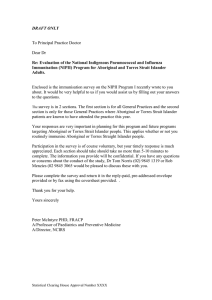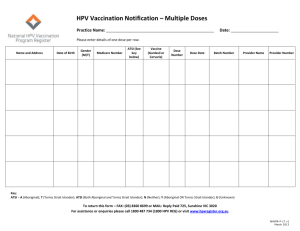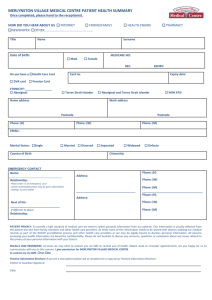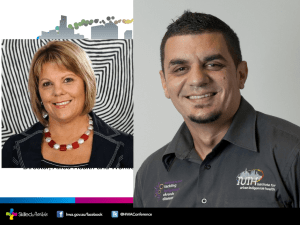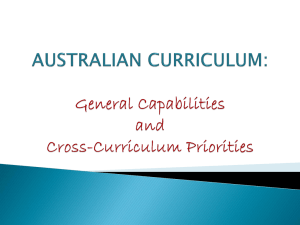2015-16 RAP - Reconciliation Australia
advertisement
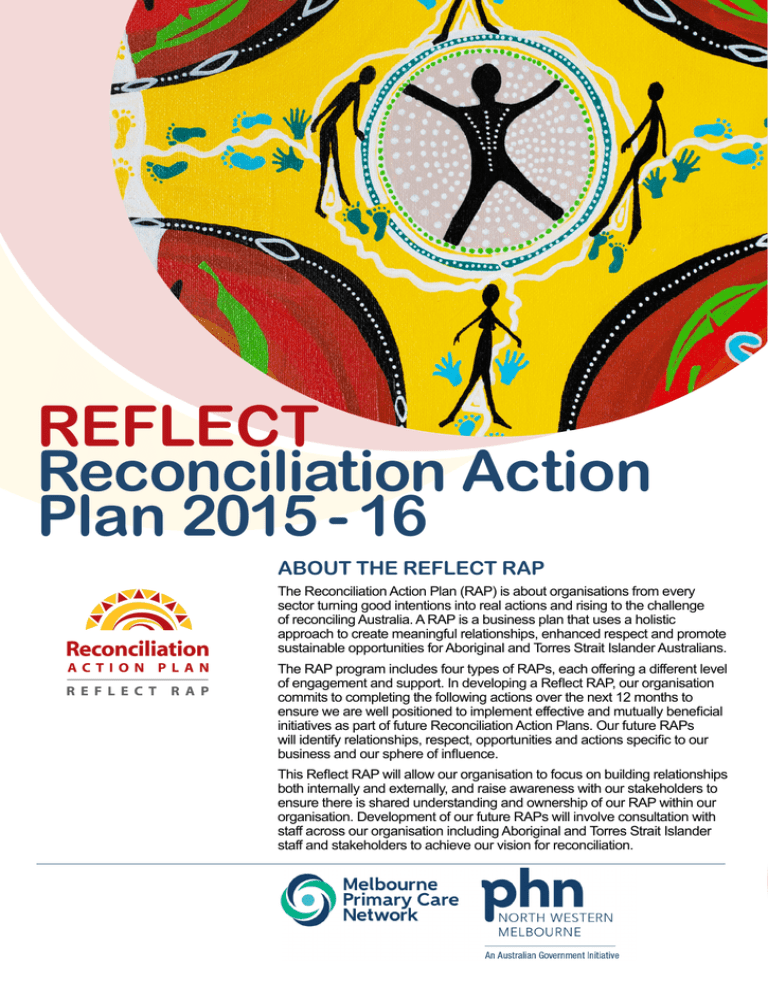
REFLECT Reconciliation Action Plan 2015 - 16 ABOUT THE REFLECT RAP The Reconciliation Action Plan (RAP) is about organisations from every sector turning good intentions into real actions and rising to the challenge of reconciling Australia. A RAP is a business plan that uses a holistic approach to create meaningful relationships, enhanced respect and promote sustainable opportunities for Aboriginal and Torres Strait Islander Australians. The RAP program includes four types of RAPs, each offering a different level of engagement and support. In developing a Reflect RAP, our organisation commits to completing the following actions over the next 12 months to ensure we are well positioned to implement effective and mutually beneficial initiatives as part of future Reconciliation Action Plans. Our future RAPs will identify relationships, respect, opportunities and actions specific to our business and our sphere of influence. This Reflect RAP will allow our organisation to focus on building relationships both internally and externally, and raise awareness with our stakeholders to ensure there is shared understanding and ownership of our RAP within our organisation. Development of our future RAPs will involve consultation with staff across our organisation including Aboriginal and Torres Strait Islander staff and stakeholders to achieve our vision for reconciliation. OUR BUSINESS Melbourne Primary Care Network (MPCN) operates the North Western Melbourne PHN as an independent, locally governed and run, not for profit organisation dedicated to improving primary health care in the local community. It is responsible for driving improvements in primary healthcare for thirteen local government areas from across Melbourne’s north and west. One of the six key priority areas of the organisation is Aboriginal and Torres Strait Islander health. MPCN improves primary healthcare services for our residents by: • Making it easier for people to access the services they need, by linking local general practitioners (GPs), nursing and other health professionals, hospitals and aged care, Aboriginal and Torres Strait Islander health organisations, and maintaining up-to-date local service directories. • Working closely with Local Hospital Networks to ensure primary health care services and hospitals work collaboratively for the benefit of their patients. • Planning and supporting local after-hours face-to-face GP services. • Identifying where local communities are missing out on services they need and coordinating services to address those gaps. • Supporting local primary care providers, such as GPs, practice nurses and allied health providers, to adopt and meet quality standards. Currently MPCN employs 60 staff who provide support to general practice and other primary health care providers. It implements primary care initiatives and programs and frontline clinical services. Our dedicated team focus on the Commonwealth Governments Closing the Gap initiatives to increase access to mainstream primary health services for Aboriginal and Torres Strait Islander peoples. The team also work closely with all staff to ensure Aboriginal and Torres Strait Islander health is considered in all program areas. We are committed to working towards closing the health gap and creating meaningful relationships, enhancing respect and promoting sustainable opportunities for Aboriginal and Torres Strait Islander Australians. OUR RAP Since inception, MPCN identified through our Aboriginal and Torres Strait Islander Needs Assessment (conducted in 2012) that Aboriginal and Torres Strait Islander health was a priority. MPCN prioritised work to engage and support the Aboriginal and Torres Strait Islander population in order to close the health gap. To improve health outcomes MPCN saw the Reconciliation Action Plan (RAP) as an opportunity to guide our planning and policy development. Consultation with the Reconciliation Australia Program Officer started in 2013 with the CEO committing MPCN to developing a Reconciliation Action Plan (RAP). The RAP continues to be championed internally by the Executive team, Program Officer and Aboriginal Health Coordinator. The RAP Working Group was established in 2014 and includes representation from Girraway Ganyi Consultancy, management and staff from the MPCN Primary Care Services team, Reform and Development team and Business Services team and the Closing the Gap Program Officer and Aboriginal Health Coordinator. Page 22 of of 64 Our partnerships/current activities Contact details MPCN has a long history of working in collaboration with Aboriginal and Torres Strait Islander partners and stakeholders. Key partnerships and activities MPCN has undertaken include: • Creating a welcoming environment for Aboriginal and Torres Strait Islander clients, partners and stakeholders, by: - Displaying a plaque acknowledging the Wurundjeri people as the Traditional Owners of the land; and, - Displaying a painting from Aboriginal artist Jeannie Pitjara Petyarre in the main reception area. • Conducting an Aboriginal Population Health Needs Assessment in February 2013 which provides an evidence base for future planning, and for prioritising actions to improve the health and wellbeing of Aboriginal and Torres Strait Islander peoples living in the catchment. • Strengthening the capacity of mainstream primary care services to provide culturally appropriate services, by: - Providing annual cultural awareness training; and, - Promoting the Practice Incentive Program - Indigenous Health Incentive (PIP IHI) to general practice. North Western Melbourne PHN (Operated by Melbourne Primary Care Network) • Partnering with cohealth to deliver the Care Coordination and Supplementary Services (CCSS) program, including primary care engagement to promote and increase referrals to the program. Level 1, 369 Royal Parade PO Box 139 Parkville, VIC 3072 • Commissioning a consultation to understand the profile of Aboriginal and Torres Strait Islander patients being admitted into our tertiary hospitals from country Victoria to determine if our CCSS program could offer more support to these patients. • Acknowledging all Aboriginal and Torres Strait Islander significant days/ events internally. • Participation and representation on a number of regional Aboriginal and Torres Strait Islander committees and organisations including: - North and West Metropolitan Region (NWMR) Project Stakeholder Group Meeting; - Koolin Balit Wellbeing Partnership Group; - Coalition for Aboriginal Health Equality, auspiced by the Victorian Aboriginal Community Controlled Health Organisation (VACCHO); and, - Inner North West Melbourne Primary Care Partnership (INWM PCP), Closing the Health Gap project. • Consultation with significant Aboriginal organisations in our catchment to inform our understanding of the health needs and service gaps of the local community; Ms Julie Borninkhof Executive Director, Primary Care Improvement julie.borninkhof@mpcn.org.au Ms Samantha Smorgon Manager, Primary Care Engagement and Support samantha.smorgon@mpcn.org.au Ms Katherine Middleton Program Officer, Diversity in Practice and Closing the Gap katherine.middleton@mpcn.org.au Ms Rosealie Vallance Acting Coordinator, Aboriginal Health rosealie.vallance@mpcn.org.au Phone: (03) 9347 1188 Fax: (03) 9347 7433 ACKNOWLEDGEMENTS Front page artwork: MPCN commissioned local artist Lynette Briggs to create an artwork that would reflect MPCN’s commitment to closing the gap in health for Aboriginal and Torres Strait Islander people in our community. Title: Walking Together Artist: Lynette Briggs Clan Group: Wiradjuri – Yorta Yorta We acknowledge the peoples of the Kulin nation as the Traditional Owners of the land on which our work in the community takes place. We pay our respects to their Elders past and present. - Victorian Aboriginal Health Service (VAHS); - Girraway Ganyi Consultancy; and - VACCHO. www.mpcn.org.au © Melbourne Primary Care Network. November, 2015. Page 33 of of 64 Reconciliation Action Plan: Relationships Working in partnership with our local Aboriginal and Torres Strait Islander communities to better understand local health issues and work towards our goal for reconciliation and to close the health gap. Action Establish a RAP Working Group, including representation from both management and staff from all areas of MPCN and an Aboriginal Mentor to support the development of the RAP. Responsibility Timeline Deliverables Program Officer, Diversity December in Practice and Closing the 2014 Gap Acting Coordinator, Aboriginal Health RAP Working Group to meet twice per year. RAP Working Group Terms of Reference established. Manager, Primary Care Engagement and Support Executive Director, Primary Care Improvement Raise all MPCN’s staff members’ awareness of the RAP and the key actions. Program Officer, Diversity March 2015 in Practice and Closing the Gap Acting Coordinator, Aboriginal Health Formally introduce the RAP at an all staff meeting. Provide staff with quarterly RAP progress updates at staff meetings. Allow discussion of how each program area can contribute to the RAP. Manager, Primary Care Engagement and Support Executive Director, Primary Care Improvement Celebrate National Reconciliation Week (NRW) Program Officer, Diversity 27 May in Practice and Closing the 3 June 2015 Gap Acting Coordinator, Aboriginal Health Social Media Campaign to raise awareness of NRW with stakeholders. Email signature included on all emails to promote NRW and demonstrate our commitment to reconciliation. All staff event – ‘lunch and learn’ to discuss new approaches to reconciliation within the organisation and to view a TED talk from Aboriginal and Torres Strait Islander speakers on reconciliation and Indigenous issues. Continue to enhance relationships with Aboriginal and Torres Strait Islander organisations and investigate new partnership opportunities. Program Officer, Diversity June 2016 in Practice and Closing the Gap Acting Coordinator, Aboriginal Health Manager, Primary Care Engagement and Support Executive Director Primary Care Improvement Page Page44of of64 Regular meetings with Aboriginal Liaison Officers (ALO) to support hospital ALO’s and the Care Coordination and Supplementary Services (CCSS) program. Annual meetings with key Aboriginal Community Controlled Health Organisations (ACCHO) in the inner north west Melbourne catchment area to discuss ways of working together and new opportunities to pursue. Regularly attend local working group meetings, including NWMR Project Stakeholder Group Meeting, Koolin Balit Wellbeing Partnership Group, Coalition for Aboriginal Health Equality, INWM PCP – Closing the Health Gap project. Reconciliation Action Plan: Respect Acknowledging and understanding our history and its impacts on the health outcomes of our local Aboriginal and/or Torres Strait Islander communities is key to building our understanding and developing long term relationships, based on respect. Action Responsibility Timeline Deliverables Acknowledge and celebrate all Aboriginal and Torres Strait Islander significant dates, including Closing the Gap Day and NAIDOC Week. Program Officer, Diversity in Practice and Closing the Gap March and July 2015 Plan events to celebrate Closing the Gap Day and NAIDOC Week. Liaise with local Aboriginal and Torres Strait Islander organisations and promote their events to MPCN staff. Acting Coordinator, Aboriginal Health Social media campaign to promote significant event dates to our stakeholders. Provide opportunities for staff to participate in local events. Make cultural development available to all MPCN staff to increase understanding and awareness of Aboriginal and Torres Strait Islander histories, cultures and contributions. Program Officer, Diversity in Practice and Closing the Gap Continue to create a welcoming environment for Aboriginal and Torres Strait Islander clients, partners and stakeholders. Executive team Raise awareness of the meaning and significance of the Acknowledgement of Country and Welcome to Country to all MPCN staff members. Executive team March and November 2015 Acting Coordinator, Aboriginal Health Cultural awareness training provided twice per year. Training to be provided by a local Aboriginal and Torres Strait Islander organisation (currently Girraway Ganyi Consultancy). All staff encouraged to attend cultural awareness training. March 2015 Plaque acknowledging the Wurundjeri people as the Traditional Owners of the land visible when entering the MPCN office environment. Aboriginal and Torres Strait Islander artworks are displayed in our offices along with a full acknowledgement of the artist and meaning of the artwork. June 2016 Develop policy to ensure the Acknowledgement of Country is performed at all MPCN meetings and events. Acknowledgement of the Wurundjeri people included on MPCN email signature and fortnightly publications that go to approximately 1200 health professionals in the MPCN catchment. Develop an information resource for all staff on the purpose and importance of the Acknowledgement of Country and Welcome to country. To be introduced at an all staff meeting. Engage general practice in the importance of improving the health outcomes of Aboriginal and Torres Strait Islander people. Support general practice and health services to provide culturally appropriate programs and services to Aboriginal and Torres Strait Islander people. Page 5 of of 64 Program Officer, Diversity in Practice and Closing the Gap Acting Coordinator, Aboriginal Health June 2016 Provide opportunities for general practice to develop culturally appropriate programs and services. Encourage general practitioners and practice staff to complete cultural awareness training (training provided twice each year). Promote and support practices to participate in the Practice Incentive Program – Indigenous Health Incentive. Promote the Care Coordination and Supplementary Services. Reconciliation Action Plan: Opportunities Creating opportunities to both improve health outcomes for Aboriginal and Torres Strait Islander people and create a more inclusive work environment. Action Responsibility Timeline Deliverables Increase Aboriginal and Torres Strait Islander employment opportunities at MPCN. Executive Team June 2016 Business Services Manager HR Coordinator Recruitment and induction processes provide support and opportunity for self-identification. For example ‘Personal Details Form’ allow employees to identify if they are from Aboriginal or Torres Strait Islander descent. A statement that encourages Aboriginal and Torres Strait Islander people to apply for positions at MPCN is included in both position descriptions and job advertisements. Develop a business case for Aboriginal and Torres Strait Islander employment within our organisation including opportunities for employment. Investigate opportunities to utilise Aboriginal and Torres Strait Islander businesses and services where appropriate. Program Officer, Diversity in Practice and Closing the Gap June 2016 Acting Coordinator, Aboriginal Health Encourage MPCN staff to utilise Aboriginal and Torres Strait Islander local businesses, for example Charcoal Lane for catering. Develop a business case for Aboriginal and Torres Strait Islander supplier diversity and how MPCN can develop an Aboriginal and Torres Strait Islander supplier diversity program. Tracking Progress Ensuring MPCN is accountable to our RAP through regular meetings and reporting activities. Action Responsibility Timeline Deliverables Provide Reconciliation Australia with an annual report of MPCN’s RAP. Program Officer, Diversity in Practice and Closing the Gap 30 Sept. 2015 Complete and submit Reconciliation Australia’s online RAP Impact Measurement Questionnaire. Review and report on RAP achievements and challenges. Program Officer, Diversity in Practice and Closing the Gap June and December 2015 Six monthly progress reports are provided to the Executive team and Board. Annually review and update the MPCN RAP. Program Officer, Diversity in Practice and Closing the Gap June 2016 Consult with the RAP working group to update the RAP. RAP Working Group Page 6 of of 64 RAP agendas and minutes are available for all staff to access.
